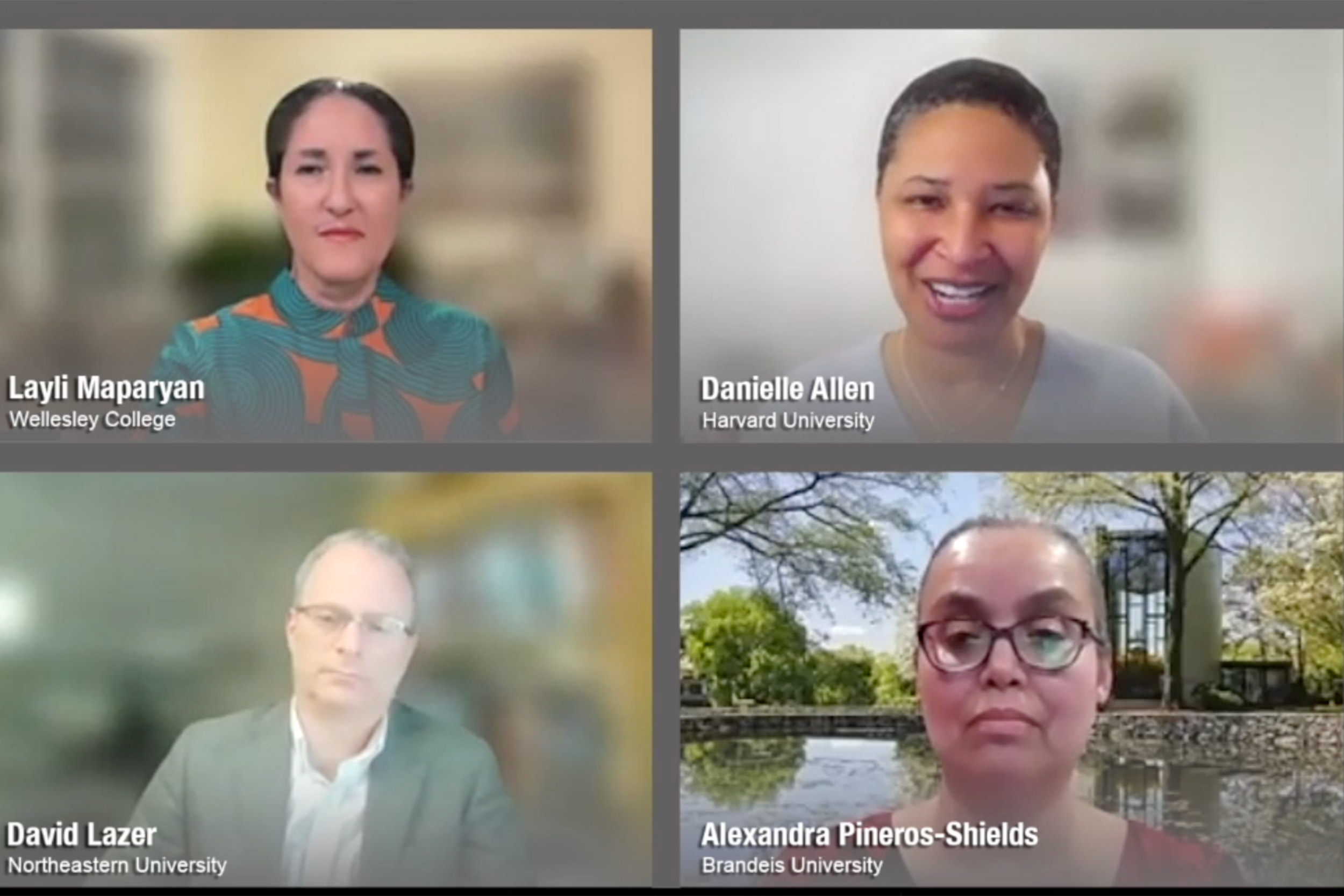
Moderator Layli Maparyan (clockwise from upper left) leads a livestream discussion with Harvard’s Danielle Allen, Brandeis’ Alexandra Pineros-Shields, and Northeastern’s David Lazer.
‘Human dignity front and center’
Dialogues event offers tools for engaging in respectful debate
Finding common ground in an era of intense political and personal division begins with mutual respect.
That was the message of “Coming Together Across Difference,” an online discussion last week featuring Danielle Allen, James Bryant Conant University Professor and professor of government; David Lazer, University Distinguished Professor of Political Science and Computer Science at Northeastern University; and Alexandra Pineros-Shields, associate professor of the practice of racial equity at Brandeis University.
Allen opened her remarks with a story of one “remarkable year” when her aunt was running for Congress with the far-left Peace and Freedom Party and her father for U.S. Senate as a Reagan Republican.
In witnessing their “incredible” dinner-table arguments, she noticed something: “Although they argued fiercely, they never ever broke the bonds of love …. They held sacred the dignity of that human being in front of them, and that set all the parameters for their arguments.”
Both her aunt and father had a shared goal of empowering their communities, and though “they disagreed mightily on the path to securing that empowerment,” their work to engage with mutual respect and “[keep] that core commitment to human dignity front and center” allowed for informative and productive dialogue.
The discussion, moderated by Layli Maparyan, Katherine Stone Kaufmann ’67 Executive Director of the Wellesley Centers for Women and Professor of Africana Studies at Wellesley College, was the second in a series called Dialogue & Action in an Age of Divides.
Organized by the provosts of Harvard, Boston College, Boston University, Brandeis, MIT, Northeastern, Tufts, UMass, and Wellesley, the programs aim to bring people together to tackle difficult issues and model constructive dialogue. It was initiated by university presidents last fall when the conflict in Israel and Palestine sparked an escalation in divisive rhetoric on college campuses.
Pineros-Shields also highlighted the importance of approaching exchanges from a place of mutual respect, recounting a story about a nonprofit she directed that worked to provide implicit-bias training for police officers in Lynn, Massachusetts. Her group, the Essex County Community Organization (ECCO), had tried for months to persuade the department to agree to participate in the program, presenting evidence as to why they needed it. But the nonprofit kept meeting resistance.
Then, ECCO flipped the script: They acknowledged their own need for improvement, scheduled training for themselves, and invited the police. The department agreed, and ECCO has since successfully conducted multiple training sessions for officers. When Pineros-Shields later asked the chief why things had finally changed, he responded, “That’s easy. You saw us as human beings.”
The participants also discussed concrete steps to improve communication.
Lazer spoke about the importance of reimagining technologies, such as social media, as more than just channels for negative engagement or validation-seeking, but as tools that can better enable human connection and learning.
Allen suggested using “tactical empathy.” If you’re in a difficult conversation, your first step should be to “mirror back … say, ‘Oh, it seems like this is what you’re saying. Is that right?’” She noted that, “Nine times out of 10, you will have misunderstood or missed some nuance.”
In addition to helping avoid unnecessary arguments, this technique also communicates that you recognize the other person “as a human being and have an interest in fully understanding their perspective before sharing your own.” This is one of the “fundamental elements of bridge-building work” — and the best way to ensure that conversations can be respectful and productive.
You can view the full recording of “Coming Together across Difference,” as well as the first event on “Hate and Free Speech,” on the Dialogue & Action Series website. The two remaining panels are scheduled for March 13 and April 2. For more information on events across Harvard related to engaging in respectful and robust debate, see Harvard Dialogues.




